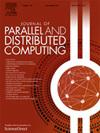Latency and cost-aware consumer group autoscaling in message broker systems
IF 3.4
3区 计算机科学
Q1 COMPUTER SCIENCE, THEORY & METHODS
引用次数: 0
Abstract
Message brokers often facilitate communication between data producers and consumers by adding variable-sized messages to ordered distributed queues. Our goal is to determine the number of consumers and consumer partition assignments needed to ensure that the data consumption rate matches the data production rate. We model this problem as a variable item size bin packing problem. As the production rate varies, new consumer–partition assignments are computed, potentially requiring the reallocation of partitions from one consumer to another. During reallocation, data in the queue are not read, leading to increased latency costs. To address this problem, we focus on the multiobjective optimization cost of minimizing the number of consumers and reducing latency. We introduce several heuristic algorithms and compare them to state-of-the-art heuristics. In our experimental setup, the proposed modified worst fit (MWF) heuristic achieves a 48% reduction, with a similar number of consumers, in comparison with the best fit decrease (BFD). In addition, MWF achieves a percentile latency of 2.24 seconds compared with that of 364.66 with the approach by Kafka using the same number of consumers. Alternatively, to obtain a lower percentile latency than our approach does, Kafka requires at least 60% more consumers than our method requires.
消息代理系统中的延迟和成本敏感消费者组自动伸缩
消息代理通常通过向有序的分布式队列中添加可变大小的消息来促进数据生产者和消费者之间的通信。我们的目标是确定确保数据消耗率与数据产生率匹配所需的消费者数量和消费者分区分配。我们将此问题建模为可变物品大小的装箱问题。随着生产速率的变化,计算新的消费者-分区分配,可能需要将分区从一个消费者重新分配到另一个消费者。在重新分配期间,不会读取队列中的数据,从而导致延迟成本增加。为了解决这个问题,我们将重点放在最小化消费者数量和减少延迟的多目标优化成本上。我们介绍了几种启发式算法,并将它们与最先进的启发式算法进行比较。在我们的实验设置中,与最佳拟合减少(BFD)相比,所提出的改进的最坏拟合(MWF)启发式在消费者数量相似的情况下实现了48%的减少。此外,在使用相同数量的消费者时,MWF实现了2.24秒的99百分位延迟,而Kafka的方法为364.66秒。或者,为了获得比我们的方法更低的99百分位延迟,Kafka需要比我们的方法至少多60%的消费者。
本文章由计算机程序翻译,如有差异,请以英文原文为准。
求助全文
约1分钟内获得全文
求助全文
来源期刊

Journal of Parallel and Distributed Computing
工程技术-计算机:理论方法
CiteScore
10.30
自引率
2.60%
发文量
172
审稿时长
12 months
期刊介绍:
This international journal is directed to researchers, engineers, educators, managers, programmers, and users of computers who have particular interests in parallel processing and/or distributed computing.
The Journal of Parallel and Distributed Computing publishes original research papers and timely review articles on the theory, design, evaluation, and use of parallel and/or distributed computing systems. The journal also features special issues on these topics; again covering the full range from the design to the use of our targeted systems.
 求助内容:
求助内容: 应助结果提醒方式:
应助结果提醒方式:


